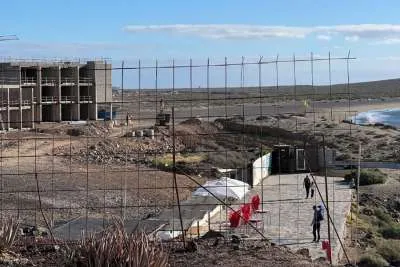Tourism to Tech Tourism - The Canary Islands and their digital future
- 03-06-2024
- Business
- Canarian Weekly
- Photo Credit: INtechTenerife
For decades, the Canary Islands have been a haven for sun-seekers, boasting idyllic beaches, crystal-clear waters, and a warm climate year-round. Tourists flock to the islands for a classic "sun, sand, and sea" holiday experience. However, the travel industry is undergoing a fascinating change. Travellers are increasingly drawn to destinations that offer more than just relaxation; they crave enriching experiences that incorporate technology.
This emerging trend, known as "tech tourism," focuses on integrating innovative digital tools and experiences into travel. Recognising this shift, the Canary Islands are at the forefront of a digital revolution, transforming themselves into a leader in tech tourism.
The Challenges of Traditional Tourism
While the "sun, sand, and sea" model has undoubtedly fuelled the Canary Islands' tourism industry for years, it faces limitations in today's evolving travel landscape. Firstly, the model caters to a specific type of tourist, potentially missing out on a broader range of travellers seeking more diverse experiences.
This can lead to a degree of homogenisation, with destinations competing solely on price and basic amenities.
Secondly, the reliance on mass tourism can bring significant challenges. Overcrowding at popular beaches and attractions can detract from the overall experience for both visitors and create problems for locals, such as housing shortages and traffic congestion.
Furthermore, the environmental impact of a large tourist influx can be significant, straining resources and potentially damaging the very beauty that attracts visitors in the first place.
Travellers today, particularly a growing segment known as "Promad" travellers, are more conscious and individualistic. Promads (professionals, managers, and adventurers) seek personalised experiences that go beyond the generic. They crave authenticity, cultural immersion, and a connection with the local environment. The traditional model often struggles to cater to these evolving demands.
The Canary Islands' Digital Transformation
Recognising the limitations of traditional tourism and the rising demand for tech-driven experiences, the Canary Islands are actively embracing digital transformation. This ambitious initiative aims to position them as a leading destination for tech tourism. Here are some key aspects of this transformation:
Smart Destinations
The islands are implementing cutting-edge technologies to enhance visitor experiences. For example, exploring volcanic landscapes through immersive Augmented Reality (AR) tours or diving into the vibrant underwater world with Virtual Reality (VR) experiences.
Interactive apps can provide personalised recommendations on local attractions, hidden gems, and cultural events, catering to individual interests. These tools not only elevate the visitor experience but also help manage crowds and spread tourism across different locations.
Sustainable Tourism through Technology
Sustainability is a major focus in the Canary Islands' digital transformation. They are incorporating technology to minimise their environmental footprint and preserve the natural beauty that attracts tourists.
For example, smart energy management systems can optimise resource use in hotels and resorts. Waste reduction apps can connect tourists with responsible disposal options and educate them on sustainable practices.
This focus on responsible tourism aligns perfectly with the values of Promad travellers, further solidifying the islands' appeal.
Investment in Infrastructure and Connectivity
The Canary Islands are investing heavily in infrastructure upgrades to create a robust digital backbone for tech tourism. High-speed internet connectivity is crucial for the seamless operation of digital tools and services.
Co-working spaces are being established to attract digital nomads and remote workers, potentially extending their visits and contributing to the local economy.
This improved infrastructure creates a foundation for innovation and positions the islands as a hub for tech-savvy travellers and businesses.
The Benefits For Businesses And The Economy
The Canary Islands' digital transformation holds immense potential for both tourism businesses and the local economy. The market is also shifting towards digital currencies for more convenience, so people can use Bit Sprix AI to stay updated on current prices. By embracing tech tourism, businesses can offer more diverse and engaging experiences, attracting a wider range of travellers and potentially extending the tourist season.
Interactive apps can streamline operations, improve communication with guests, and offer targeted advertising. Overall, these initiatives can lead to increased revenue and a more competitive edge for local businesses.
Furthermore, the focus on tech attracts tech-savvy individuals and businesses, fostering innovation and potentially leading to the development of new tourism-related technology companies.
This diversification can create additional jobs and revenue streams, boosting the overall economic well-being of the Canary Islands.
The Canary Islands' digital transformation is about keeping pace with the evolving travel industry, and it's a strategic move to become a leader in tech tourism. By embracing technology to enhance experiences, promote sustainability, and foster innovation, the islands are poised to attract new travellers and secure a thriving future for their tourism industry.
How To Overcome Obstacles For A Sustainable Future In The Canary Islands?
The Canary Islands' digital transformation journey is not without its challenges. Small and Medium Enterprises (SMEs) that form the backbone of the tourism industry might lack the financial resources or technical expertise to fully implement new technologies.
Additionally, shifting a traditional business culture towards tech-driven practices can be met with resistance.
However, several strategies are being employed to overcome these obstacles. The government is playing an important role by offering financial support and training programs to help SMEs integrate technology into their operations.
Educational initiatives can help bridge the digital skills gap and equip tourism professionals with the necessary knowledge to incorporate tech tools effectively.
Crucially, the Canary Islands understand that digital transformation must go hand-in-hand with preserving the natural beauty that attracts tourists in the first place. Technology can be a powerful tool for sustainable tourism.
Data analytics can be used to monitor visitor flow and minimise environmental impact in fragile areas. Educational apps can promote responsible tourism practices among visitors, fostering respect for the island's unique ecosystem.
Final Thoughts
The Canary Islands' embrace of digital transformation positions them as a frontrunner in the exciting realm of tech tourism. By offering innovative experiences, prioritizing sustainability, and fostering a tech-savvy environment, they are attracting a new generation of travellers and securing their economic future.
This journey serves as an inspiration for other tourist destinations to adapt and integrate technology to create a more enriching, sustainable, and future-proof travel industry.
As the Canary Islands continue on their digital path, the future of tourism looks bright, promising a vibrant blend of innovation, responsible practices, and the timeless allure of these volcanic islands.



























































